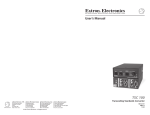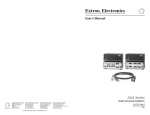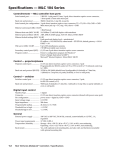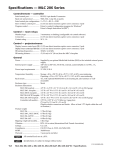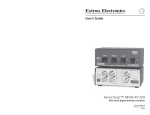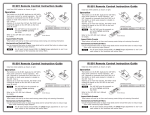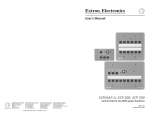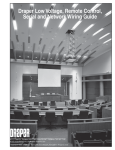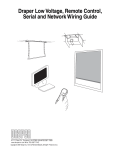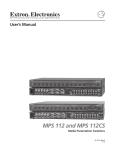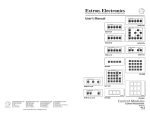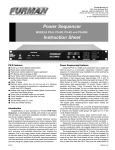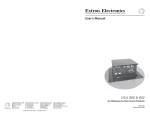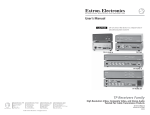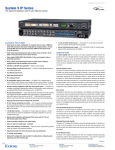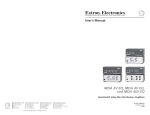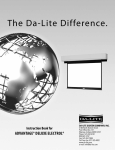Download Extron electronic SCP 150 AAP User's Manual
Transcript
User’s Manual SCREEN POSITION DOWN STOP UP RCM-SC ROOM CONTROL SCREEN POSITION LIGHTING ON / OFF RCM-SCLT Relay Control Modules Control Accessories www.extron.com Extron Electronics, USA Extron Electronics, Europe Extron Electronics, Asia Extron Electronics, Japan 1230 South Lewis Street Anaheim, CA 92805 USA 714.491.1500 Fax 714.491.1517 Beeldschermweg 6C 3821 AH Amersfoort The Netherlands +31.33.453.4040 Fax +31.33.453.4050 135 Joo Seng Road, #04-01 PM Industrial Building Singapore 368363 +65.6383.4400 Fax +65.6383.4664 Daisan DMJ Building 6F 3-9-1 Kudan Minami Chiyoda-ku, Tokyo 102-0074 Japan +81.3.3511.7655 Fax +81.3.3511.7656 © 2002 Extron Electronics. All rights reserved. 68-631-01 Printed in the USA Precautions Safety Instructions • English This symbol is intended to alert the user of important operating and maintenance (servicing) instructions in the literature provided with the equipment. This symbol is intended to alert the user of the presence of uninsulated dangerous voltage within the product's enclosure that may present a risk of electric shock. Caution Read Instructions • Read and understand all safety and operating instructions before using the equipment. Retain Instructions • The safety instructions should be kept for future reference. Follow Warnings • Follow all warnings and instructions marked on the equipment or in the user information. Avoid Attachments • Do not use tools or attachments that are not recommended by the equipment manufacturer because they may be hazardous. Consignes de Sécurité • Français Ce symbole sert à avertir l’utilisateur que la documentation fournie avec le matériel contient des instructions importantes concernant l’exploitation et la maintenance (réparation). Ce symbole sert à avertir l’utilisateur de la présence dans le boîtier de l’appareil de tensions dangereuses non isolées posant des risques d’électrocution. Attention Lire les instructions• Prendre connaissance de toutes les consignes de sécurité et d’exploitation avant d’utiliser le matériel. Conserver les instructions• Ranger les consignes de sécurité afin de pouvoir les consulter à l’avenir. Respecter les avertissements • Observer tous les avertissements et consignes marqués sur le matériel ou présentés dans la documentation utilisateur. Eviter les pièces de fixation • Ne pas utiliser de pièces de fixation ni d’outils non recommandés par le fabricant du matériel car cela risquerait de poser certains dangers. Sicherheitsanleitungen • Deutsch Dieses Symbol soll dem Benutzer in der im Lieferumfang enthaltenen Dokumentation besonders wichtige Hinweise zur Bedienung und Wartung (Instandhaltung) geben. Dieses Symbol soll den Benutzer darauf aufmerksam machen, daß im Inneren des Gehäuses dieses Produktes gefährliche Spannungen, die nicht isoliert sind und die einen elektrischen Schock verursachen können, herrschen. Achtung Lesen der Anleitungen • Bevor Sie das Gerät zum ersten Mal verwenden, sollten Sie alle Sicherheits-und Bedienungsanleitungen genau durchlesen und verstehen. Aufbewahren der Anleitungen • Die Hinweise zur elektrischen Sicherheit des Produktes sollten Sie aufbewahren, damit Sie im Bedarfsfall darauf zurückgreifen können. Befolgen der Warnhinweise • Befolgen Sie alle Warnhinweise und Anleitungen auf dem Gerät oder in der Benutzerdokumentation. Keine Zusatzgeräte • Verwenden Sie keine Werkzeuge oder Zusatzgeräte, die nicht ausdrücklich vom Hersteller empfohlen wurden, da diese eine Gefahrenquelle darstellen können. Instrucciones de seguridad • Español Este símbolo se utiliza para advertir al usuario sobre instrucciones importantes de operación y mantenimiento (o cambio de partes) que se desean destacar en el contenido de la documentación suministrada con los equipos. Este símbolo se utiliza para advertir al usuario sobre la presencia de elementos con voltaje peligroso sin protección aislante, que puedan encontrarse dentro de la caja o alojamiento del producto, y que puedan representar riesgo de electrocución. Precaucion Leer las instrucciones • Leer y analizar todas las instrucciones de operación y seguridad, antes de usar el equipo. Conservar las instrucciones • Conservar las instrucciones de seguridad para futura consulta. Obedecer las advertencias • Todas las advertencias e instrucciones marcadas en el equipo o en la documentación del usuario, deben ser obedecidas. Evitar el uso de accesorios • No usar herramientas o accesorios que no sean especificamente recomendados por el fabricante, ya que podrian implicar riesgos. FCC Class A Notice Warning Power sources • This equipment should be operated only from the power source indicated on the product. This equipment is intended to be used with a main power system with a grounded (neutral) conductor. The third (grounding) pin is a safety feature, do not attempt to bypass or disable it. Power disconnection • To remove power from the equipment safely, remove all power cords from the rear of the equipment, or the desktop power module (if detachable), or from the power source receptacle (wall plug). Power cord protection • Power cords should be routed so that they are not likely to be stepped on or pinched by items placed upon or against them. Servicing • Refer all servicing to qualified service personnel. There are no userserviceable parts inside. To prevent the risk of shock, do not attempt to service this equipment yourself because opening or removing covers may expose you to dangerous voltage or other hazards. Slots and openings • If the equipment has slots or holes in the enclosure, these are provided to prevent overheating of sensitive components inside. These openings must never be blocked by other objects. Lithium battery • There is a danger of explosion if battery is incorrectly replaced. Replace it only with the same or equivalent type recommended by the manufacturer. Dispose of used batteries according to the manufacturer's instructions. Note: This equipment has been tested and found to comply with the limits for a Class A digital device, pursuant to part 15 of the FCC Rules. These limits are designed to provide reasonable protection against harmful interference when the equipment is operated in a commercial environment. This equipment generates, uses and can radiate radio frequency energy and, if not installed and used in accordance with the instruction manual, may cause harmful interference to radio communications. Operation of this equipment in a residential area is likely to cause harmful interference, in which case the user will be required to correct the interference at his own expense. Note: This unit was tested with shielded cables on the peripheral devices. Shielded cables must be used with the unit to ensure compliance. Avertissement Alimentations• Ne faire fonctionner ce matériel qu’avec la source d’alimentation indiquée sur l’appareil. Ce matériel doit être utilisé avec une alimentation principale comportant un fil de terre (neutre). Le troisième contact (de mise à la terre) constitue un dispositif de sécurité : n’essayez pas de la contourner ni de la désactiver. Déconnexion de l’alimentation• Pour mettre le matériel hors tension sans danger, déconnectez tous les cordons d’alimentation de l’arrière de l’appareil ou du module d’alimentation de bureau (s’il est amovible) ou encore de la prise secteur. Protection du cordon d’alimentation • Acheminer les cordons d’alimentation de manière à ce que personne ne risque de marcher dessus et à ce qu’ils ne soient pas écrasés ou pincés par des objets. Réparation-maintenance • Faire exécuter toutes les interventions de réparationmaintenance par un technicien qualifié. Aucun des éléments internes ne peut être réparé par l’utilisateur. Afin d’éviter tout danger d’électrocution, l’utilisateur ne doit pas essayer de procéder lui-même à ces opérations car l’ouverture ou le retrait des couvercles risquent de l’exposer à de hautes tensions et autres dangers. Fentes et orifices • Si le boîtier de l’appareil comporte des fentes ou des orifices, ceux-ci servent à empêcher les composants internes sensibles de surchauffer. Ces ouvertures ne doivent jamais être bloquées par des objets. Lithium Batterie • Il a danger d'explosion s'll y a remplacment incorrect de la batterie. Remplacer uniquement avec une batterie du meme type ou d'un ype equivalent recommande par le constructeur. Mettre au reut les batteries usagees conformement aux instructions du fabricant. Vorsicht Stromquellen • Dieses Gerät sollte nur über die auf dem Produkt angegebene Stromquelle betrieben werden. Dieses Gerät wurde für eine Verwendung mit einer Hauptstromleitung mit einem geerdeten (neutralen) Leiter konzipiert. Der dritte Kontakt ist für einen Erdanschluß, und stellt eine Sicherheitsfunktion dar. Diese sollte nicht umgangen oder außer Betrieb gesetzt werden. Stromunterbrechung • Um das Gerät auf sichere Weise vom Netz zu trennen, sollten Sie alle Netzkabel aus der Rückseite des Gerätes, aus der externen Stomversorgung (falls dies möglich ist) oder aus der Wandsteckdose ziehen. Schutz des Netzkabels • Netzkabel sollten stets so verlegt werden, daß sie nicht im Weg liegen und niemand darauf treten kann oder Objekte darauf- oder unmittelbar dagegengestellt werden können. Wartung • Alle Wartungsmaßnahmen sollten nur von qualifiziertem Servicepersonal durchgeführt werden. Die internen Komponenten des Gerätes sind wartungsfrei. Zur Vermeidung eines elektrischen Schocks versuchen Sie in keinem Fall, dieses Gerät selbst öffnen, da beim Entfernen der Abdeckungen die Gefahr eines elektrischen Schlags und/oder andere Gefahren bestehen. Schlitze und Öffnungen • Wenn das Gerät Schlitze oder Löcher im Gehäuse aufweist, dienen diese zur Vermeidung einer Überhitzung der empfindlichen Teile im Inneren. Diese Öffnungen dürfen niemals von anderen Objekten blockiert werden. Litium-Batterie • Explosionsgefahr, falls die Batterie nicht richtig ersetzt wird. Ersetzen Sie verbrauchte Batterien nur durch den gleichen oder einen vergleichbaren Batterietyp, der auch vom Hersteller empfohlen wird. Entsorgen Sie verbrauchte Batterien bitte gemäß den Herstelleranweisungen. Advertencia Alimentación eléctrica • Este equipo debe conectarse únicamente a la fuente/tipo de alimentación eléctrica indicada en el mismo. La alimentación eléctrica de este equipo debe provenir de un sistema de distribución general con conductor neutro a tierra. La tercera pata (puesta a tierra) es una medida de seguridad, no puentearia ni eliminaria. Desconexión de alimentación eléctrica • Para desconectar con seguridad la acometida de alimentación eléctrica al equipo, desenchufar todos los cables de alimentación en el panel trasero del equipo, o desenchufar el módulo de alimentación (si fuera independiente), o desenchufar el cable del receptáculo de la pared. Protección del cables de alimentación • Los cables de alimentación eléctrica se deben instalar en lugares donde no sean pisados ni apretados por objetos que se puedan apoyar sobre ellos. Reparaciones/mantenimiento • Solicitar siempre los servicios técnicos de personal calificado. En el interior no hay partes a las que el usuario deba acceder. Para evitar riesgo de electrocución, no intentar personalmente la reparación/ mantenimiento de este equipo, ya que al abrir o extraer las tapas puede quedar expuesto a voltajes peligrosos u otros riesgos. Ranuras y aberturas • Si el equipo posee ranuras o orificios en su caja/alojamiento, es para evitar el sobrecalientamiento de componentes internos sensibles. Estas aberturas nunca se deben obstruir con otros objetos. Batería de litio • Existe riesgo de explosión si esta batería se coloca en la posición incorrecta. Cambiar esta batería únicamente con el mismo tipo (o su equivalente) recomendado por el fabricante. Desachar las baterías usadas siguiendo las instrucciones del fabricante. Extron’s Warranty Extron Electronics warrants this product against defects in materials and workmanship for a period of three years from the date of purchase. In the event of malfunction during the warranty period attributable directly to faulty workmanship and/or materials, Extron Electronics will, at its option, repair or replace said products or components, to whatever extent it shall deem necessary to restore said product to proper operating condition, provided that it is returned within the warranty period, with proof of purchase and description of malfunction to: USA, Canada, South America, and Central America: Extron Electronics 1230 South Lewis Street Anaheim, CA 92805, USA Asia: Extron Electronics, Asia 135 Joo Seng Road, #04-01 PM Industrial Bldg. Singapore 368363 Europe, Africa, and the Middle East: Extron Electronics, Europe Beeldschermweg 6C 3821 AH Amersfoort The Netherlands Japan: Extron Electronics, Japan Daisan DMJ Bldg. 6F, 3-9-1 Kudan Minami Chiyoda-ku, Tokyo 102-0074 Japan This Limited Warranty does not apply if the fault has been caused by misuse, improper handling care, electrical or mechanical abuse, abnormal operating conditions or non-Extron authorized modification to the product. If it has been determined that the product is defective, please call Extron and ask for an Applications Engineer at (714) 491-1500 (USA), 31.33.453.4040 (Europe), 65.6383.4400 (Asia), or 81.3.3511.7655 (Japan) to receive an RA# (Return Authorization number). This will begin the repair process as quickly as possible. Units must be returned insured, with shipping charges prepaid. If not insured, you assume the risk of loss or damage during shipment. Returned units must include the serial number and a description of the problem, as well as the name of the person to contact in case there are any questions. Extron Electronics makes no further warranties either expressed or implied with respect to the product and its quality, performance, merchantability, or fitness for any particular use. In no event will Extron Electronics be liable for direct, indirect, or consequential damages resulting from any defect in this product even if Extron Electronics has been advised of such damage. Please note that laws vary from state to state and country to country, and that some provisions of this warranty may not apply to you. Table of Contents Chapter 1 • Introduction .......................................................... 1-1 About the Relay Control Modules ................................. 1-2 Features ...................................................................................... 1-2 Chapter 2 • Installation and Operation ......................... 2-1 Installation Overview .......................................................... 2-2 UL Requirements .................................................................... 2-3 Rear Panel Connectors and Switches .......................... 2-4 Cabling ........................................................................................ 2-5 MLC relay wiring for an RCM-SC .......................................... 2-8 MLC relay wiring for an RCM-SCLT ....................................... 2-9 Front Panel Features and Operation ......................... 2-13 Setting Up the Buttons ..................................................... 2-13 Testing/Troubleshooting .................................................. 2-15 Mounting the Control Module Into an AAP Wallplate or Device Faceplate ............................ 2-16 Appendix A • Specifications, Part Numbers, Accessories, and Dimensions ............................................... A-1 Specifications ......................................................................... A-2 Included Parts ......................................................................... A-3 Accessories ............................................................................... A-3 Cables ......................................................................................... A-3 Dimensions .............................................................................. A-4 All trademarks mentioned in this manual are the properties of their respective owners. 68-631-01 Rev. A Printed in the USA 01 02 Relay Control Modules • Table of Contents i Table of Contents, cont’d Relay Control Modules 1 Chapter One Introduction About the Relay Control Modules Features ii Relay Control Modules • Table of Contents Introduction About the Relay Control Modules The Extron Relay Control Modules (RCMs) are hard-wired remote control keypads designed for use with the Extron MediaLink Controller (MLC). Refer to the MediaLink Controllers User’s Manual for information on installing, operating, and setting up the controller. All setup must be done via RS-232. See chapter two and refer to the MediaLink Control Program or the MediaLink Controllers User’s Manual for details. Each control module fits into a double-space high area (1.4” H x 3.5” W) in an Extron Architectural Adapter Plate, interface, or distribution amplifier. The relay control modules toggle relays within a MediaLink Controller to operate controls for various items in a room (such as a screen control or a light switch). The RCM-SC controls the movement of a projection screen. The RCM-SCLT controls up/ down screen movement and also lighting. In this manual Relay Control Modules are referred to as “modules”, “RCMs”, or “control modules” when instructions apply to more than one model. Features Grey, black, or white faceplates — The control modules are offered in three shades for integration into a variety of environments. System expandability — Up to four control modules (RCMs, infrared control modules/IRCMs, audio control modules/ ACMs) can be daisy chained together in any combination and connected to a MediaLink Controller to provide basic A/V source and room control from several locations. Furniture and wall mountability — The control modules can be mounted onto or in furniture or walls if they are installed in optional mounting plates (AAP 102, AAP 104) or in the MediaLink Controller’s accessory faceplates. Relay Control Modules 2 Chapter Two Installation and Operation Installation Overview UL Requirements Rear Panel Connectors and Switches Cabling Front Panel Features and Operation Testing/Troubleshooting 1-2 Relay Control Modules • Introduction Installation and Operation Installation Overview CAUTION Installation and service must be performed by authorized personnel only. These products should be used with UL approved electrical boxes. See “UL Requirements”, page 2-3. To install and set up Relay Control Modules, follow these steps: 1 Turn the equipment off. Make sure that the control module(s) and the MediaLink Controller (MLC) are disconnected from the power source. 2 Run cables through the wall or furniture where the control module(s) will be installed. 3 If applicable, follow the site preparation (hole cutting, electrical box or mud ring/mounting bracket installation, and cable preparation) instructions included with the device, faceplate, or AAP wall plate into which the control module will be installed. Cable clamps should be used to hold the cables in place for strain relief. Trim back and/or insulate exposed cable shields with heat shrink to reduce the chance of short circuits. 4 2-2 Attach the control module(s) to the Extron faceplate(s) or AAP wall plate(s). 5 Set the identification DIP switches on each control module’s circuit board. 6 Connect daisy-chained control modules to each other (if applicable). Wire the 3.5 mm, 5-pole captive screw connectors on both ends of each cable that will connect one control module to another. Plug the wired connectors into the receptacles on the back of the control modules. 7 Connect the control module(s) to the MLC. At the control module end of the cable, wire the connector that will attach the MLC to the control module(s). Plug the wired connector into the receptacles on the back of the control module(s), and insert and fasten the wires to the appropriate pins of the MLS/Power port on the bottom of the MLC. 8 Connect the projector’s RS-232 port to the MLC’s Display/ Source Control RS-232 port (refer to the MediaLink Controllers User’s Manual). If infrared control modules (IRCMs) are part of the system, connect IR Emitters or an IR Broadcaster to the MLC’s Display/Source Control IR port. Relay Control Modules • Installation and Operation 9 Connect a MediaLink Switcher (MLS) to the MLC 206 and to the projector, if applicable. 10 Restore power to the MLC, and connect the optional MLS switcher to a power supply. 11 Set up the MLC. The setup/configuration requires an RS-232 connection to the MLC’s Config port. Setup should be done before the MLC is installed into the wall or furniture. 12 Press a button on each control module. If the expected action (a lighting or screen position change, for example) doesn’t occur, disconnect power from the MLC and verify correct connector wiring at both ends of the cable(s). 13 Mount the MLC and the faceplate/wallplate containing the control module(s) into the wall/furniture. Make sure that the faceplate is grounded. UL Requirements 1. These units are not to be connected to a centralized DC power source or used beyond their rated voltage range. 2. These units must be installed in UL listed junction boxes. The UL approved electrical wall box (junction box) is not included with the control module; the installer is responsible for obtaining and installing the box. 3. These units must be installed with accordance with the National Electrical Code and with local electrical codes. Relay Control Modules • Installation and Operation 2-3 Installation and Operation, cont’d Rear Panel Connectors and Switches For each control module to be connected to an MLC, set the rear panel DIP switches, then follow these steps: 1 1 A B C D E A B C D E 1 2 ON 2 The same type and quantity of connectors and DIP switches shown above can be found on the rear panels of all models of the control modules. 1 Cabling 1. If it hasn’t already been done when the wall box was installed, cut a length of Extron Comm-Link cable to go between the MLC and the control module. 2. Using the following diagram as a guide, attach a 3.5 mm, 5-pole captive screw connector to the end of the cable that will be plugged into the control module, and connect wires on the other end of the cable to the MLC’s IR/RCM port (a 4-pole direct insertion captive screw connector). Wire both ends of the cable identically (pin A to pin A, pin B to pin B, etc.). Control Module connector Communications connectors — Use these connectors to connect control modules together and to connect them to the MLC and to an optional IR Link infrared repeater. Both connectors function the same way, so they are interchangeable. ABCD E RCM Control Module(s) ROOM CONTROL SCREEN POSITION LIGHTING ON / OFF Plug one end of an Extron Comm-Link cable into one of these 3.5 mm, 5-pole captive screw connectors, and plug the other end into a connector on another control module or an IR Link, or connect those wires to the direct insertion IR/RCM captive screw connector of an MLC. Do not install more than one IR Link. 2 DIP switches — Set these switches to identify the address of each module. Each module must have a unique address. Note the direction of the arrow on the switch. ON 1 2 ON 1 2 3 4 Address DIP switches can be 4-position or 2-position, but only 1 and 2 are used. 1, 2 — Control module address identification — See the following illustrations for the appropriate settings for each address. 3, 4 — Not used ON 1 and 2 down (off) = address 0, control module #1 1 2 A A +12VDC Ground ( ) B B C Control signal (RCM/ C IRCM) DISPLAY POWER MLC IR / RCM port VCR DVD Laptop VOLUME MAX/ MIN Extron A B C D MLC 206 MediaLink Controller IR / RCM MLC 206 MLC 206 to a Relay Control Module Only three wires are required, but use four wires (A, B, C, D) if an IR Link infrared repeater will be daisy chained with the control modules. Refer to the IR Link User’s Manual for details. Do not install more than one IR Link in a MediaLink system. Also, do not connect more than four control modules (RCMs, ACMs, IRCMs) at a time to an MLC. ON 1 up (on), 2 down (off) = address 1, control module #2 1 2 ON 1 down (off), 2 up (on) = address 2, control module #3 The MLC contains three relays, so you may install a maximum of one RCM-SC or one RCM-SCLT in a system with an MLC. 1 2 ON 1 up (on), 2 up (on) = address 3, control module #4 1 2 DIP switch settings 2-4 Relay Control Modules • Installation and Operation Relay Control Modules • Installation and Operation 2-5 Installation and Operation, cont’d 5. A B C D E A B C D E Plug one end of the cable into the control module’s remaining communications connector, and plug the other end into a communications connector on the next control module. The photo below shows control modules (RCM, IRCMs, and/or ACMs) connected to an MLC in a typical daisy chain setup. To 1–2 additional Control Modules (IRCMs, ACMs, RCMs) Control Module #2 rear view MLM faceplate MLC 206 rear view Control Module To an MLS switcher A B C Control Module DVD CONTROL Tx MENU Control Module #1 rear view TITLE A B C D E A B C D E ENTER REW PLAY NEXT PAUSE RS-232 projector connection STOP Control Module 1 2 ON ROOM CONTROL SCREEN POSITION LIGHTING ON / OFF MLC IR / RCM port IR Emitter RCM Control Module A A +12VDC Ground ( ) B B C Control signal (RCM/ C IRCM) (Connect 1 per each IRCM.) IR Link Infrared Repeater rear view DISPLAY POWER VCR DVD Laptop VOLUME MAX/ MIN A daisy chain of control modules connected to an MLC 206 A B C D IR / RCM Extron MLC 206 MediaLink Controller MLC 206 to a daisy chain of Control Modules MLC 206 Connectors are included with each control module, but the cable must be purchased separately. See appendix A for cable part numbers and conductor gauges. 2-6 3. Plug the 5-pole connector into one of the control module’s communications connectors. 4. Cut a cable and attach 5-pole connectors to both ends of it for each additional control module that will be connected in a daisy chain. Wire both ends of the cable identically (pin A to pin A, pin B to pin B, etc.). Up to a total of 4 control modules in any combination of models can be daisy chained together and connected to the MLC. Relay Control Modules • Installation and Operation 6. Connect the MLC’s rear/bottom panel relay ports to a screen controller or a relay controller (A/C trigger box) if it is appropriate for your installation. Use the following block diagrams as a general reference, and refer to the wiring diagrams that came with the screen. The MLC contains three relays, so you may install a maximum of one RCM-SC or one RCM-SCLT in a system with an MLC. Many different brands and models of low voltage controllers can be used with the MLC and RCM to control screen movement. A few examples are given on the following pages, but different models require different wiring. Relay Control Modules • Installation and Operation 2-7 Installation and Operation, cont’d MLC relay wiring for an RCM-SC For Stewart Filmscreen screen controllers, a momentary closure between the up and common terminals, the down and common terminals, or the stop and common terminals will cause the screen to go up, go down, or stop. Low Voltage Controller Stop Low Voltage Controller SCREEN POSITION DISPLAY POWER DOWN VCR DVD STOP UP MLC Relay Ports Laptop VOLUME UNSWITCHED MAX/ RCM-SC MIN 1A Up 100-240V - 5AMAX Extron Up MLC 206 MediaLink Controller 1B MLC 206 w/ AAP A typical RCM-SC application The diagrams included here are examples only. Your equipment may have different wiring requirements. Refer to the specific wiring instructions provided by the manufacturer of the screen controller that you are using. For DaLite and Draper screen controllers, a momentary closure between either the up and common terminals or the down and common terminals causes the screen to move up or move down. A momentary closure between all three terminals (up, down, and common) stops the screen in its current position. Use the included diodes (1N4001 or equivalent) for reverse bias protection. Low Voltage Controller 2A Down MLC Relay Ports 3A Stop Stop 3B Common MLC relay wiring block diagram for an RCM-SC and a Stewart SFC Control (part #6300891) screen controller MLC relay wiring for an RCM-SCLT For controllers, a momentary closure between either the up and common terminals or the down and common terminals causes the screen to move up or move down. A latching contact toggles the AC power/lighting (or other) controller on and off. 1A Red Up 1B 2A Black Down 2B Down AC Power Controller 2B 3A White (Da Lite) Blue (Draper) Low Voltage Controller Stop 3B ROOM CONTROL DISPLAY POWER SCREEN POSITION VCR DVD Laptop VOLUME LIGHTING ON / OFF UNSWITCHED MAX/ RCM-SC LT MIN MLC relay wiring block diagram for an RCM-SC and a Da Lite single motor LVC-4 (part #40973) screen controller or a Draper single motor LVCIII screen controller (part #6300858) Use 1N4001 or equivalent diodes (100mA maximum current through the diode, 50V maximum reverse bias) for the Da Lite and Draper installations shown above. 2-8 Relay Control Modules • Installation and Operation 100-240V - 5AMAX Extron MLC 206 MediaLink Controller MLC 206 w/ AAP A typical RCM-SCLT application Relay Control Modules • Installation and Operation 2-9 Installation and Operation, cont’d The diagrams included here are examples only. Your equipment may have different wiring requirements. Refer to the specific wiring instructions provided by the manufacturer of the screen controller and AC power controller that you are using. Low Voltage Controller Red (Da Lite/Draper) Up (Stewart) The following two illustrations give examples of how to connect a relay controller to the MLC to turn lights or another device on and off. Refer to the manual that came with the controller for specific wiring information for the equipment you are using. MLC Relay Ports 1A 1 2 3 4 Up AC1 1B Black (Da Lite/Draper) Down (Stewart) OFF ON 2A Down 2B CONTROL 1 2 3 4 White (Da Lite) Blue (Draper) 110 VAC/1200W 110 VAC 50/60 HZ Common (Stewart) 3A AC Power Controller 3A 3B 12VDC 3B Common MLC relay wiring block diagram for an RCM-SCLT and a Da Lite (#40973), Draper (#6300858), or Stewart (#6300891) screen controller and a relay controller 2-10 Relay Control Modules • Installation and Operation MLC Relay Port Connecting an AMX PC-1 AC power controller to the MLC for lighting control The AMX PC-1 relay box can be configured for momentary or latching operation. All front panel DIP switches should be in the down position for latching mode operation. See AMX’s instructions if you need to change modes. Also set the MLC’s relay to “latching” and “normally open”. Relay Control Modules • Installation and Operation 2-11 Installation and Operation, cont’d Front Panel Features and Operation 120 VAC 50/60 Hz MAX LOAD 15 A SCREEN POSITION DOWN ROOM CONTROL STOP UP SCREEN POSITION LIGHTING C ON / OFF LISTED 7Z37 PROFESSIONAL AUDIO EQUIPMENT MINIPORT-15 POWER RELAY CLASS2 WIRING +12VDC 6Ma MAX STATUS REM GND POWER DELAY OUT 3A RCM-SC Front 1 2 1 1 3 RCM-SCLT Front 1 Screen Position Up ( )/Down ( ) buttons — These buttons can be set up (via the control software) to toggle the screen to move up or down. 2 Screen Position Stop button — Press this button to stop the up/down motion of the screen. 3 Lighting On/Off button — This button acts like a light switch, toggling the room lights on or off when pressed. This button must also be set up via the control software before it can control the lights. 3B MLC Relay Port Connecting a Furman MiniPort-15 AC power controller to the MLC for lighting control For the Furman controller, connect pins 3A and 3B of the MLC’s relay port to the 12VDC and REM poles. The relay should be set for latching connection, and the MLC contacts should be set to “normally open”. 7. Use the MediaLink Control Software to set up the modules and the relays. See “Setting Up the Buttons” in this chapter for details. Setting Up the Buttons Before the control module’s buttons can control the MLC’s relays, you must set up the MLC for each of the RCM’s buttons. Refer to the MediaLink Control Program for specific details. 1. Cable and supply power to the MLC, the control module(s), and a host computer. 2. Start the Windows-based MediaLink Control Program. 3. In the Controller (MLC) Configuration section of the program, select (click on) the control module button that you wish to set up, and select (click on) the box corresponding to the relay you want to tie to that button. Assign the appropriate relay to each RCM button in the Controller (MLC) Config section of the software. In the Relay & Misc. Options section of the software, set all the relays to NO (normally open). Also set the relays used for screen control to momentary contact, and set relays used for lighting control to latching contact. 2-12 Relay Control Modules • Installation and Operation Relay Control Modules • Installation and Operation 2-13 Installation and Operation, cont’d Testing/Troubleshooting Before installing the control modules into the wall or furniture, test the system to make sure that the connections are correct and the modules are working correctly. 4. 6. Connect the cables between the MLC and the control module(s), connect IR Emitters or an IR Broadcaster to the MLC (if IRCM modules are used), and connect a host computer to the MLC’s Config port. If available, cable the A/V source device(s) to the display device (projector), and connect the projector and any relay-controllable items to the MLC. Refer the MediaLink Controller User’s Manual for wiring diagrams. 2. Connect the MLC to a 12VDC power source. Connect the host computer, A/V source device(s), and projector to a power source and turn them on. 3. Start the MediaLink Control Program, and set up the control modules and the MLC (for each button set up the relays, select or type in RS-232 commands, or perform IR learning). 4. Press the buttons on the control module, watch the module’s LED (for IRCM and ACM modules), and observe the item being controlled by the module (lights, screen, projector mount, VCR, DVD, MLS switcher, etc.). In the Relay & Misc. Options portion of the control program, select the appropriate options for each relay. For example, set the relays that are tied to the Screen Position Up ( ), Screen Position Down ( ), and Stop buttons to Momentary, and select the duration for the momentary contact. For the relay that is tied to the Lighting On/Off button (RCM-SCLT only), select Latched. 5. 1. Set each relay to (NO) Open (normally open). Refer to the MediaLink Controllers User’s Manual and the MediaLink Control Program for more information. Repeat steps 3, 4, and 5 for each RCM button. The MLC contains three relays, so you may install a maximum of one RCM-SC or one RCM-SCLT in a system with an MLC. 4A If the LED does not light when a button is pressed, check the captive screw connector wiring at both the MLC and the control module. If the conductor assignments are not the same at both ends, the circuits may be damaged if power is applied to the wrong pole, and the control module will not turn on. Verify that the connectors are wired identically at both ends of the cable. 4B If power is present at the MLC and at the control module, but the item being controlled does not respond when a button is pressed: • Make sure the control module’s address DIP switch settings are correct and that each module has a unique address. • For IRCM and CM modules, check the MediaLink control software to verify that an IR command has been “learned” for that button. • For IRCM and CM modules, verify that an IR Emitter or IR Broadcaster has been connected to the MLC’s Display/Source Control IR connector. 2-14 Relay Control Modules • Installation and Operation Relay Control Modules • Installation and Operation 2-15 Installation and Operation, cont’d All IR control signals are sent to all devices (video sources, projector, etc.) at the same time even if two or three IR Emitters or an IR Broadcaster are installed. The IR sending devices share the same IR Display/Control port on the MLC. • For RCM modules, ensure that the wiring from the MLC to the screen motor’s low voltage controller is correct. Refer to the screen manufacturer’s user’s guides. For the RCM-SCLT, ensure that the wiring from the MLC to the AC power controller is correct for the model you are using. 5. Call the Extron S3 Sales and Technical Support Hotline if the item(s) being controlled still does (do) not respond when the control module’s buttons are pressed. Mounting the Control Module Into an AAP Wallplate or Device Faceplate The control module and any other adapter plates must be attached to a device faceplate or AAP wallplate and cabled before the device or wallplate is installed in a wall or furniture. The screws needed for installing the control module are built into its front panel, so no additional screws will be needed. 1. Before any cables are attached, insert the control module’s screws through the holes in the device’s faceplate or AAP wallplate. Secure the control module to the faceplate/ wallplate with the provided captive washers and #4-40 nuts. 2. Follow steps 5 through section of this chapter. 3. If the control module is not installed into a grounded metal wall box, ground the faceplate before fastening the faceplate into the wall or furniture. 12 A Appendix A Specifications, Part Numbers, Accessories, and Dimensions in the “Installation Overview” Do not tie a module’s faceplate to both a separate earth ground and the circuit ground (via a connector pin). If you tie a product to two different ground sources, you may introduce ground loops or other grounding-related problems into the system. 2-16 Relay Control Modules Relay Control Modules • Installation and Operation Specifications Included Parts Accessories Cables Dimensions Specifications, Part #s, Accessories, Dimensions Specifications Included Parts These items are included in each order for a control module: General Power ............................................. 12VDC from the MLC 206 Temperature/humidity .............. Storage -40° to +158°F (-40° to +70°C) / 10% to 90%, non-condensing Operating +32° to +122°F (0° to +50°C) / 10% to 90%, non-condensing Rack mount ................................... Yes, with optional faceplate, and furniture/wall mountable with optional faceplates or AAP wall plates Enclosure type .............................. Metal Enclosure dimensions Faceplate ................... 1.4" H x 3.5" W x 0.1” D (3.5 cm H x 8.9 cm W x 0.3 cm D) (double space high AAP plate) Boards ........................ 1.3" H x 2.6" W x 0.9" D (3.3 cm H x 6.6 cm W x 2.3 cm D) (Depth excludes buttons. Allow at least 2.1” (5.3 cm) depth in the wall/furniture.) Product weight ............................. 0.1 lbs (<0.1 kg) Shipping weight ........................... 1 lbs (0.5 kg) Vibration ....................................... ISTA/NSTA 1A in carton (International Safe Transit Association) Listings .......................................... UL, CUL as components of the MLC 206 Compliances ................................. CE, FCC Class A, VCCI, AS/NZS, ICES as components of the MLC 206 MTBF ............................................. 30,000 hours Warranty ....................................... 3 years parts and labor Included parts or Part number RCM-SC (grey, black, white) 70-183-01, -02, -03 RCM-SCLT (grey, black, white) 70-184-01, -02, -03 3.5 mm, 5-pole captive screw connectors 10-319-10 1N4001 or equivalent diodes (100mA max. current, 50V max. reverse bias) for Da Lite and Draper installations Relay Control Modules User’s Manual 68-631-01 Accessories Accessories Part number AAP 102 (grey, black, white) (2 gang) 60-300-01, -02, -03 AAP 104 (grey, black, white) (4 gang) 60-301-01, -02, -03 Cables Comm-link cable Part number 50 feet/15.2 meters long 26-461-01 100 feet/30.5 meters long 26-461-02 Specifications are subject to change without notice. (7.32-112601-D1) Conductor gauges in Extron Comm-Link cables red and black single strands (for power/ground) 18 AWG white and violet shielded single strands (for signals) 22 AWG drain wire A-2 Relay Control Modules • Specifications, Part #s, Dimensions 24 AWG Relay Control Modules • Specifications, Part #s, Dimensions A-3 Specifications, Part Numbers, Accessories, cont’d Dimensions The following diagrams have been reduced to fit on the page. All dimensions are given in inches. The symbol “ø“ indicates a diameter. RCM dimensions .363 .182 .160 DETAIL A +.000/ Ø.160-.010 max. extrusion around stud on far side, +.003/ +.003/ Ø.112-.000 thru (4 places). Ø.166-.000 thru (2 places). PEM insert BSOS-440-16 or equiv. Insert from near side. 2.900 PEM insert FHS-440-6 or equiv. Insert from near side. (4 req'd) +.000 1.390-.015 1.195 1.045 0.695 DETAIL A 0.345 0.195 0.000 3.500 3.250 2.786 1.750 0.600 0.714 0.250 0.000 (5 PLCS) R.050 (4 PLCS) RCM-SC +.000/ Ø.160-.010 max. extrusion around stud on far side, +.003/ +.003/ Ø.112-.000 thru (4 places). Ø.166-.000 thru (2 places). PEM insert BSOS-440-16 or equiv. Insert from near side. 2.900 PEM insert FHS-440-6 or equiv. Insert from near side. (4 req'd) +.000 1.390-.015 1.195 1.045 0.695 DETAIL A 0.345 0.195 0.000 3.500 3.250 2.786 1.232 0.714 0.600 0.250 0.000 (5 PLCS) R.050 (4 PLCS) RCM-SCLT A-4 .320 Relay Control Modules • Specifications, Part #s, Dimensions















